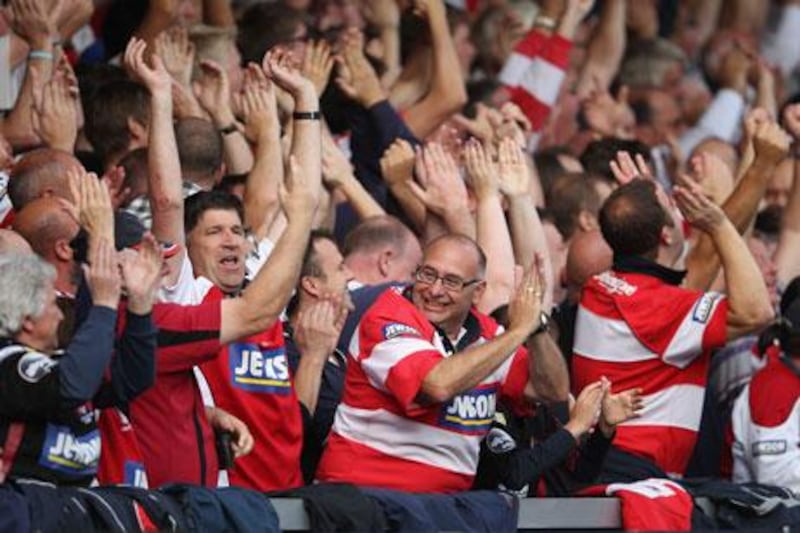Sports fans have historically been treated like cattle but recently we have morphed into a new species: guinea pigs.
Specifically, scientists' guinea pigs. Not top-notch scientists, of course. They are too busy discovering the secrets of the universe to concern themselves with the study of angry men pointlessly shouting abuse, ridicule and the occasional piece of advice to a group of professional athletes.
Lesser scientists, however - presumably those in need of a quick pay cheque or the giddy thrill of recognition from the popular press - are turning our sporting arenas into giant laboratories.
In the English Rugby Premiership, for example, scientists from the University of Bath are visiting six crunch matches this season to determine which set of fans is the most "passionate".
They measure noise, heart rates and even testosterone levels of selected fans throughout match day before concluding which group cares the most. In the first experiment, for example, Gloucester fans beat their Bath counterparts by a "passion score" of 177 to 129.
Well, there's one to tell the grandchildren, although one wonders what would happen in the event of a tie. A kind of passion penalty shoot-out, perhaps, in which individual fans take turns to emit ever-increasing howls of anguish?
Also promising to "test your passion" is the so-called Sharp Fan Lab, a "Europe-wide study of football fans" launched as part of the build-up to next summer's European Championship.
Like the rugby study, this project will carry out biometric tests on fans during tournament matches, as well as analysing crucial data like which nation has bought the most replica shirts.
Its website promises to answer questions like "Are the Germans more confident than the Italians?", "Are the English more optimistic than the French?" And "What exactly is the typical Montenegrin fan like?"
You know, the sort of stuff you lie awake worrying about. Why am I being so miserable about this supposedly harmless fun?
Firstly, because I am always uncomfortable with invitations to make sweeping generalisations about people from other regions. The greatest gift of international sport is its power to unify different cultures and emphasise our similarities, not use cod-science to draw more divides.
Secondly, because measuring such arbitrary notions as "passion" interferes with the purity of sport. The only result that matters in sport is displayed on the scoreboard, not the clipboard.
Muddying the waters with issues like crowd passion plays into the hands of those poor deluded souls who telephone sports radio shows to argue: "They may have beaten us, but we sang louder."
Which brings me to my third objection to this nonsense: fans should know their place.
Our job is to fill the coffers and create some atmosphere. That's it. In recent years, however, buoyed by the pandering of a content-hungry media and the polite lies of managers and players about the "twelfth man", fans have demanded an ever greater share of the limelight.
"Never mind the players" we cry, like attention-starved toddlers, "look at us instead. See our waves, hear our vuvuzelas, respond to our knee-jerk demands."
Fans submit to the cold probing hands of these quacks in white coats because it feeds their vanity and self-aggrandisement. It makes them feel wanted and important, rather than the walking cash cow they really are.
Frankly, I preferred being treated like cattle. At least it was honest.
What's the good word, again?
The furious post-match row between Arsenal’s Emmanuel Frimpong and Manchester City’s Samir Nasri last week will have divided the football family.
Traditionalists will be disgusted at yet another display of the rampant aggression which casts a shadow over the beautiful game, particularly when players who have moved from the Gunners to City are involved. Remember Emmanuel Adebayor’s pitch-long sprint and slide goading of his former fans?
Tribalists, on the other hand, probably savoured the scrap. Let’s face it, Carling Cup matches can be stodgy fare, so you take whatever added spice is offered.
Their only disappointment will be the failure of television cameras to follow the action into the tunnel, where it was alleged punches were thrown – although club officials insisted there was only the violent posturing known as “handbags”.
Both groups, however, will have been united by at least one common reaction: “What the dickens is Dench?”
The mystery word was emblazoned across Frimpong’s vest in the sort of bold capital font usually reserved for advertising golf sales.
I initially assumed it was a tribute to Dame Judi Dench, the esteemed actress. But it wasn’t.
So was it a typing error? Knowing how thirsty he gets after a match, and not wishing to expend valuable energy asking for a drink, perhaps it was meant to say “Drench”?
Or was it supposed to say “Bench”? Certainly, you would not put it past the good folk at Nike to develop a substitute’s singlet, ergonomically designed to maximise the body’s performance while it sits around waiting to play. That might have explained why the bench warming Nasri was so peeved.
But no. It turns out that Dench is a clothing range launched by Frimpong in partnership with the rapper, Lethal Bizzle. Which makes you wonder if the fight was genuine or simply a ruse to attract the cameras and enjoy a free plug for his business.
In which case, you might say that Dench manufactures both clothing and handbags.





